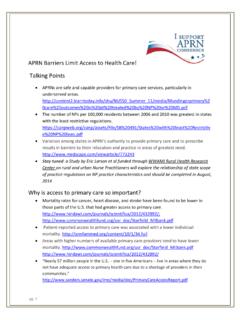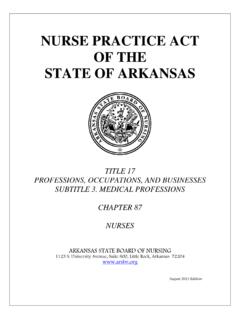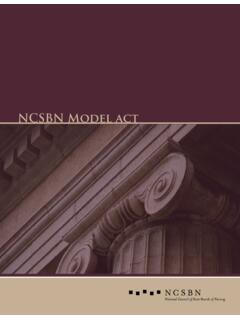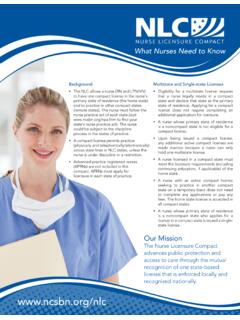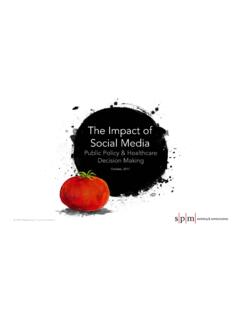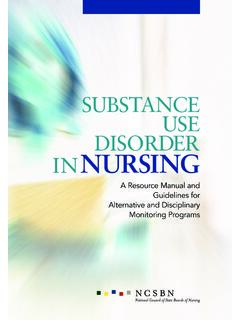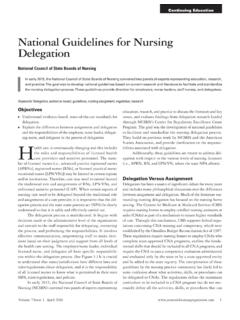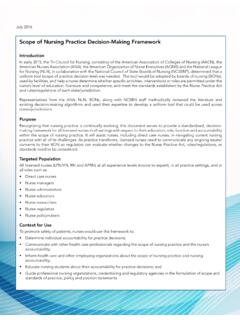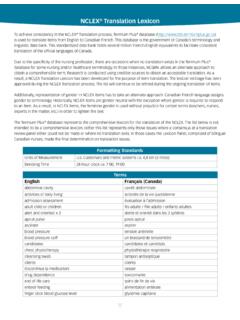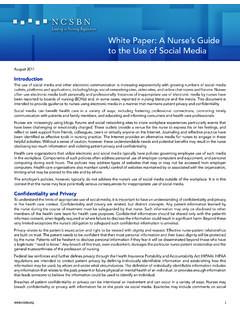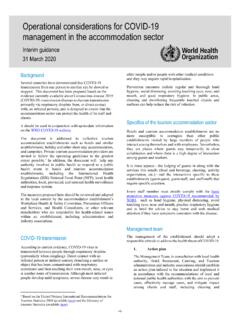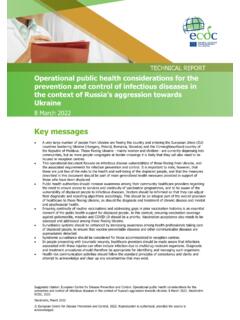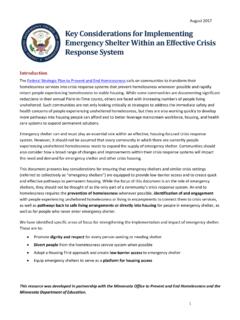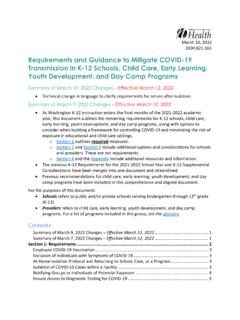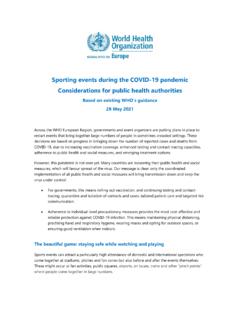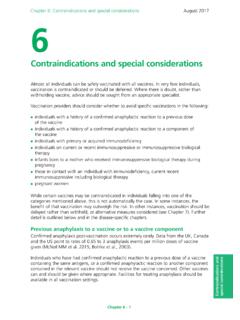Transcription of Changes In Healthcare Professions’ Scope of Practice: …
1 Changes In Healthcare Professions Scope of Practice: Legislative ConsiderationsExecutive Summary .. 3 Changes in Healthcare Professions Scope of Practice: Legislative considerations .. 5 Purpose Background Historical Context IntroductionThe Purpose of Regulation .. 8 Defining Scope of Practice Assumptions Related to Scope of PracticeThe Basis for Decisions Related to Changes in Scope of Practice .. 11 Historical Basis Education and Training Evidence Regulatory EnvironmentThe Basis for Legislative Decision Making .. 15 Conclusion ..15 Appendix .. 161In 2009, a new era of Healthcare reform is sweeping state and federal government in the During these difficult economic times policymakers are faced with many challenges, not the least of which are legislative and regulatory debates on how to maximize the use of all Healthcare practitioners and the debate among Healthcare practitioners, regarding the continuous evolution of scopes of practice.
2 Law and rule makers charged with consumer protection will find this document helpful in guiding discussions on how the most effective and efficient care can be delivered to the American public in an era of continuous Changes in SummaryThis document is a result of a collaborative effort in 2006 by representatives from six Healthcare regulatory organizations. It has been developed to assist legislators and regulatory bodies with making decisions about Changes to Healthcare professions scopes of practice. Proposed Changes to a Healthcare professions Scope of practice often elicit strongly worded comments from several professional interest groups. Typically, these debates are perceived as turf battles between two or more professions, with the common refrain of this is part of my practice so it can t be part of yours.
3 Often lost among the competing arguments and assertions are the most important issues of whether this proposed change will better protect the public and enhance consumers access to competent Healthcare services. Healthcare education and practice have developed in such a way that most professions today share some skills or procedures with other professions. It is no longer reasonable to expect each profession to have a completely unique Scope of practice, exclusive of all others. We believe that Scope of practice Changes should reflect the evolution of abilities of each Healthcare discipline, and we therefore have attempted to develop a rational and useful way to make decisions when considering practice act on reports from the Institute of Medicine1 and the Pew Healthcare Commission2 we propose a process for addressing Scope of practice, which is focused on patient safety.
4 The question that Healthcare professionals must answer today is whether their profession can provide this proposed service in a safe and effective manner. If an issue does not address this question, it has no relevance to the discussion. This process gets to the heart of regulation which, according to Schmitt and Shimberg, is intended to:1. Ensure that the public is protected from unscrupulous, incompetent and unethical practitioners ;2. Offer some assurance to the public that the regulated individual is competent to provide certain services in a safe and effective manner ; and3. Provide a means by which individuals who fail to comply with the profession s standards can be disciplined, including the revocation of their licenses. 3 The argument for Scope of practice Changes should have a foundational basis within four areas: 1) an established history of the practice Scope within the profession, 2) education and training, 3) supporting evidence, and 4) appropriate regulatory environment.
5 If a profession can provide support evidence in these areas, the proposed Changes in Scope of practice are likely to be in the public s best Crossing the Quality Chasm: A New health System for the 21st Century, The Institute of Medicine, National Academy Press, Reforming Healthcare Workforce Regulation: Policy considerations for the 21st Century, Report of the Pew health Professions Commission s Taskforce on Healthcare Workforce Regulation, December 1995, Demystifying Occupational and Professional Regulation: Answers to Questions You May Have Been Afraid to Ask, Schmitt, K. and Shimberg, B., Council on Licensure, Enforcement and Regulation, in Healthcare Professions Scope of Practice: Legislative ConsiderationsA. PurposeThe purpose of this document is to provide information and guidance for legislative and regulatory agency decision making regarding Changes in the Scope of practice of Healthcare professions.
6 Specifically, the purpose is to:n Promote better consumer care across professions and competent providersn Improve access to caren Recognize the inevitability of overlapping scopes of envision this document as an additional resource to be used by state legislatures, Healthcare professions and regulatory boards in preparing proposed Changes to practice acts and briefing legislators regarding those Changes , just as various professions model practice acts are used. B. BackgroundThis paper was a collaborative project developed by representatives of the regulatory boards of the following Healthcare professions: medicine, nursing, occupational therapy, pharmacy, physical therapy and social work. It attempts to address Scope of practice issues from a public protection viewpoint by determining whether a specific Healthcare profession is capable of providing the proposed care in a safe and effective believe that it is critical to review Scope of practice issues broadly if our regulatory system is going to achieve the recommendations made by both the Institute of Medicine and the Pew health Commission Taskforce on Healthcare Workforce Regulation.
7 These reports urge regulators to allow for innovation in the use of all types of clinicians in meeting consumer needs in the most effective and efficient way, and to explore pathways to allow all professionals to provide services to the full extent of their current knowledge, training, experience and Historical ContextThe history of professional licensure must be taken into account if one is to understand the current regulatory system governing Scope of practice. Physicians were the first health professionals to obtain legislative recognition and protection of their practice authority. The practice of medicine was defined in broad and undifferentiated terms to include all aspects of individuals care. Therefore, when other Healthcare professions sought legislative recognition, they were seen as claiming the ability to do tasks which were already included in the universal and implicitly exclusive authority of medicine.
8 This dynamic has fostered a view of Scope of practice that is conceptually faulty and potentially IntroductionThe Scope of practice of a licensed Healthcare profession is statutorily defined in each state s laws in the form of a practice act. State legislatures have the authority to adopt or modify practice acts and therefore adopt or modify a particular Scope of practice of a Healthcare profession. Sometimes such modifications of practice acts are just the formalization of Changes already occurring in education or practice within a profession, due to the results of research, advances in technology, and Changes in societal Healthcare demands, among other things. This process sometimes pits one profession against another before the state legislature.
9 As an example, one profession may perceive another profession as encroaching into their area of practice. The profession may be economically or otherwise threatened and therefore opposes the other profession s legislative effort to change Scope of practice. Proposed Changes in scopes of practice that are supported by one profession but opposed by other professions may be perceived by legislators and the public as turf battles. These turf battles are often costly and time consuming for the regulatory bodies, the professions and the legislators Aside from guidance on Scope of practice issues, this document may assist in preventing costly legislative battles; promote better consumer care and collaboration among regulatory bodies, the professions and between competent providers; and improve access to Strengthening Consumer Protection: Priorities for Healthcare Workforce Regulation, Report from Pew health Professions Commission, Purpose of RegulationBefore providing information regarding Scope of practice decisions, we must ask the very basic question, What is the purpose of regulation?
10 According to Schmitt and Shimberg, regulation is intended to:1. Ensure that the public is protected from unscrupulous, incompetent and unethical practitioners ;2. Offer some assurance to the public that the regulated individual is competent to provide certain services in a safe and effective manner ; and3. Provide a means by which individuals who fail to comply with the profession s standards can be disciplined, including the revocation of their licenses. 5 A. Defining Scope of PracticeA 2005 Federation of State Medical Boards report defined Scope of practice as the Definition of the rules, the regulations, and the boundaries within which a fully qualified practitioner with substantial and appropriate training, knowledge, and experience may practice in a field of medicine or surgery, or other specifically defined field.
